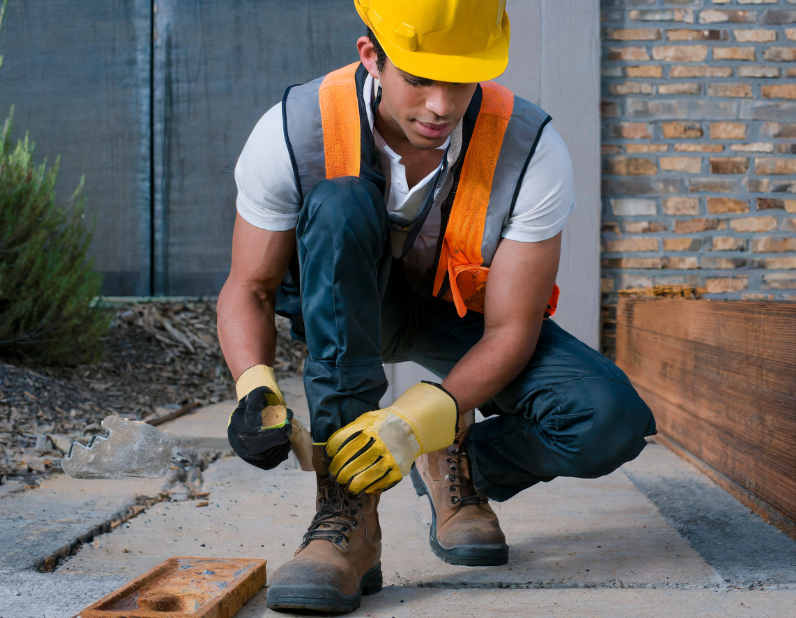In any professional environment, selecting the correct footwear is more than a fashion statement—it's essential for the safety, comfort, and efficiency of the workers. This is particularly true in industries where the work environment is demanding and hazardous. The significance of work shoes, particularly in high-risk sectors like construction and heavy industry, cannot be overstated. In this comprehensive guide, we will illuminate the key considerations for choosing the right work shoes specific to your industry, highlighting the pivotal role footwear plays in the lives of those whose daily grind is a little more intense.

Understanding the Need for the Right Work Shoes
Safety and comfort are not just employee benefits; they are key elements that directly contribute to the bottom line. Outfitting your team with the correct footwear ensures they can move freely without the fear of injuries, and that their physical comfort translates into mental focus—both leading to heightened productivity.
A Balancing Act of Safety and Comfort
For professionals spending eight or more hours on their feet, the impact of footwear is ubiquitous. Choosing shoes that provide the right support can prevent long-term health issues such as back pain and joint problems. In contrast, a comfortable pair that meets safety standards can significantly reduce on-the-job accidents.
The Link Between Shoes and Productivity
Work-related injuries and discomfort result in downtime and decreased job performance. The adage 'time is money' is especially true in today's fast-paced industry settings. Shoes with proper cushioning and support not only keep workers safer but also more energetic, translating to sustained productivity throughout the day.
Industry-Specific Requirements
Different work environments necessitate distinct footwear specifications. Understanding these unique necessities is a critical step in selecting the right pair of work shoes.
The Unyielding Construction Sector
For those in construction, footwear must be robust, with a focus on durability and impact protection. Steel toe shoes are a minimum requirement for many construction sites, offering protection from falling debris and heavy materials that might otherwise cause serious injury.
Heavy-Duty Industrial Settings
In industrial environments, it's all about footwear that can handle the pressures of a heavy workload. This means prioritising slip-resistant soles, toe caps, and often electrical hazard rated shoes to maintain both safety and performance in highly mechanised areas.
Regulatory Compliance
Understanding and adhering to industry-specific safety guidelines is paramount. Steel toe shoes are not the only standard; for example, the food service industry requires workers to have anti-slip footwear to prevent accidents in slick conditions.
Tips for Choosing the Right Work Shoes
Selecting the optimal work shoes demands consideration of several critical factors, including the working environment, the individual's foot size and shape, the shoe materials, and the necessary features for the job.
The Fit Is More Than a Feature
A proper fit is critical for the long hours of wear on the job. Ill-fitting shoes can lead to blisters, calluses, and a myriad of foot problems. Pro-tip—shop for shoes in the late afternoon or early evening when your feet are at their largest.
Material Matters
The material of your work shoes contributes not only to longevity but also breathability and waterproofing. Leather and synthetic fabrics are common choices, both offering benefits in different working conditions.
Sole Considerations
The right sole can mean the difference between staying sure-footed or slipping on the job. Tread patterns, material grip, and sole flexibility all play into the underfoot protection offered by work shoes.
The Right Toe Protection
Steel toes aren't the only option for toe protection—composite materials offer a lighter yet still durable alternative. Understanding the potential hazards to your toes and selecting accordingly is an absolute necessity.
Maintenance and Replacement
Properly maintaining your work shoes—cleaning, drying, and regularly checking for wear—is as important as choosing the right pair. Additionally, knowing when to replace your work shoes before they wear out can prevent injuries.
Benefits of Suitable Work Shoes
The return on investment in high-quality, appropriate work shoes is substantial. From preventing injuries to boosting workforce morale, the benefits are far-reaching.
Preventing Workplace Injuries
The correct work shoes are your first line of defence against accidents, from slips and falls to blunt traumas. An investment in good footwear is an investment in safety.
Enhancing Job Performance
Reducing stress and fatigue on the body leads to better performance and job satisfaction. A well-protected and comfortable workforce is a productive one.
Long-Term Cost Savings
While the initial outlay for quality work shoes might seem steep, the costs of workplace accidents and the subsequent compensation can be significantly higher. Additionally, durable work shoes may outlast their cheaper counterparts multiple times over.
Enhancing Safety and Confidence with the Right Mens Safety Boots
Finding the perfect pair of men's safety boots can be a daunting task, especially when navigating the vast options available online. However, taking action by visiting a specialised footwear page can drastically simplify this process. Online shopping for safety boots not only provides a convenient way to compare different styles and prices but also offers the opportunity to review crucial safety features and certifications essential for your specific industry. It's important to ensure the price includes VAT, to avoid any unexpected costs, and to read customer reviews to buy with confidence. By carefully selecting your work footwear from a reputable online source, you can enhance your safety and comfort on the job, ultimately boosting your productivity and peace of mind.
Conclusion
Selecting work shoes should never be a hasty decision. By taking the time to evaluate the specific requirements of your industry, maintaining a proactive approach to footwear care, and understanding the benefits of a well-protected workforce, you're investing in the safety and efficiency of your business. Remember, the right work shoes aren't one-size-fits-all—they're industry-fit, and that makes all the difference.
